八年级英语上册Unit2_sectionA课件[1]
仁爱版八年级英语上册-Unit-2-Topic-2-Section-A-课件(共32张PPT)

6. --I have a headache. ---___B___
A.I’m sorry to. B. I’m sorry to hear that. C. I’m sorry for D. I’m sorry.
7.--What’s wrong with Kangkang?
--He __A_____ tired.
□
□
7. going to school without breakfast
W__e__sh_o_u_l_d__h_a_v_e_b__re_a_k_f_a_s_t__b_e_f_ore we go to school.
□
□
8. brushing teeth twice a day
___________________________
1. 动名词作主语,谓语用第 三人称单数(be用is )的用 法。
2. Learn the modal verbs: 情态动词must/mustn’t.
1、抄写新单词 2、列举出五种对身体健康有 益的生活习惯。
单项选择: 1.—Which habit(习惯) is bad for
your health? —__B____
Yous_h_o_u_ld_n_’_t_/_m_u_s_t_n_’t(should/ shouldn’t)/
( must/ / mustn’t)smoke .
Because it __is__b_a_d___fo__r__our healh .
shouldn’t
He ____________(should/ shouldn’t)read in the sun.
仁爱版八年级英语上册 Unit 2 Topic 2 Section
人教版英语八年级上册《 Unit2 Section A 》课件.doc
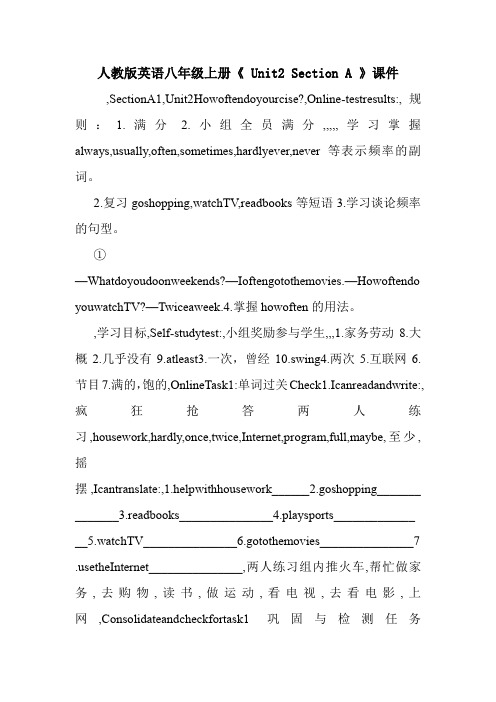
人教版英语八年级上册《 Unit2 Section A 》课件,SectionA1,Unit2Howoftendoyourcise?,Online-testresults:,规则: 1.满分 2.小组全员满分,,,,,学习掌握always,usually,often,sometimes,hardlyever,never等表示频率的副词。
2.复习goshopping,watchTV,readbooks等短语3.学习谈论频率的句型。
①—Whatdoyoudoonweekends?—Ioftengotothemovies.—Howoftendo youwatchTV?—Twiceaweek.4.掌握howoften的用法。
,学习目标,Self-studytest:,小组奖励参与学生,,,1.家务劳动8.大概2.几乎没有9.atleast3.一次,曾经10.swing4.两次5.互联网6.节目7.满的,饱的,OnlineTask1:单词过关Check1.Icanreadandwrite:,疯狂抢答两人练习,housework,hardly,once,twice,Internet,program,full,maybe,至少,摇摆,Icantranslate:,1.helpwithhousework______2.goshopping_______ _______3.readbooks_______________4.playsports_____________ __5.watchTV_______________6.gotothemovies_______________7 .usetheInternet_______________,两人练习组内推火车,帮忙做家务,去购物,读书,做运动,看电视,去看电影,上网,Consolidateandcheckfortask1巩固与检测任务1,Write,1.____________________2.__________3.__________4.__ ________5.__________,helpwithhousework,readabook,rcise,watch TV,goshopping,Lookatthepicture.Makealistoftheweekendactivities.,1 a,OnlineTask2:(微课1)频度副词的用法,小组讨论(3mins)组内推火车回答,频率副词,always意为“总是”,表示动作的重复或状态的延续。
人教新目标英语八年级上 Unit 2 Section A (2d~3a) 精品课件

Section A (2d~3a)
Warming-up Presentation
Practice Production
Teaching aims
1. 掌握频率副词always,usually,often,sometimes,hardly ever,never及频 度词组once a week,twice a month等的用法。
Chain game.
Work in groups of four to make sentences with the frequency words as the example.
hardly ever
always
often
usually
Example: Jane: I hardly ever eat fast food. Tara: I always read books, and Jane hardly ever eats fast food. Maria: I often play basketball, Tara always reads books, and Jane hardly ever eats fast food. Jim: I usually go to bed at 11, Maria often play basketball, Tara always read books, and Jane hardly ever eats fast food.
✔✔
✔
✔
2. — How often does she do housework? — She does housework _f_o_u_r_t_im__e_s_a_w__e_ek__.
1人教版英语八年级上册Unit 2 Section A 2a-2d优质课件

watches TV
exercises plays soccer
1人教版英语八年级上册Unit 2 Section A 2a-2d优质课件
2a Listen. Cheng is talking about how often he does
频 usually
度 often
副
sometimes hardly ever
词 never(0%)
______II_au_l_swu__aa_yl_lsy__uw_s_ae_t_tch_h_e_TI_nV__t.ernet. ________________I____IIh_I_____a__nso____orfe____dtmv____el_e___nye_r___t__e_s_ih_m_l_v_e_e___ee_le___rp_p_s____p__wll__i__las__a_i_tt_t___yeeh____(n__c__h__o__t_o睡_moump懒seuuw觉tseoirc)r.gk.a. mes.
How often every day once a week twice a week
three times a week once a month twice a month
1人教版英语八年级上册Unit 2 Section A 2a-2d优质课件
Tapescript
Reporter: So, Cheng, how often do you watch TV?
Jack: Really? How come?
Claire: I have dance and piano lessons.
仁爱英语八年级上册Unit2 Topic1 sectionA (共30张PPT)

Fill in the blanks.
Feeling
Reason
Suggestion
bad have a stomachache
night and went to bed very late.
Jane:
I see. Staying up late is bad for your
health. You should go to bed early and
you’ll feel better tomorrow.
Kangkang: Right! I must have a good rest.
1a Read aloud after the MP3.
Jane:
Kangkang, you look tired. What’s wrong?
Kangkang: I have a headache.
Jane:
I’m sorry to hear that. What caused it?
Kangkang: I watched a soccer game on TV last
A: I feel
because
B: Oh,
is bad for
You must/should
.
Suggestion see a dentist
. .
( Lingling)
look bad
(because)
toothache (will)
eat too much candy (should)
人教版八年级英语上册Unit 2 Section A (Grammar Focus -3c)课件

How often do you exercise?
Section A (Grammar Focus-3c)
课前准备
1.英语课本; 2.黑、红笔,荧光笔; 3.笔记本; 4.便利贴若干张。
Learning aims:
Be able to ask and answer activities and talk about how often people do them.
➢ Key sentences: 1. How often does he watch TV? 2. What do they do on weekends ? 3. He plays at least twice a week.
➢ To learn the usage of adverbs of frequency and review the present simple tense.
2. My mother wants me to play the guitar. (同义句转换)
My motherw__o_u_ld__ _li_k_e__ me to play the guitar.
3. We eat meat twice a week. (同义句)
I go to the movies maybe once a month.
How often does he watch TV? He hardly ever watches TV.
Do you go shopping?
No, I never go shopping.
复习一般现在时
当主语是第三 人称单数时
_W__h_a_t_ __d_o they _d_o_ on weekends?
Unit2 Section A 1a-1c课件人教版八年级英语上册
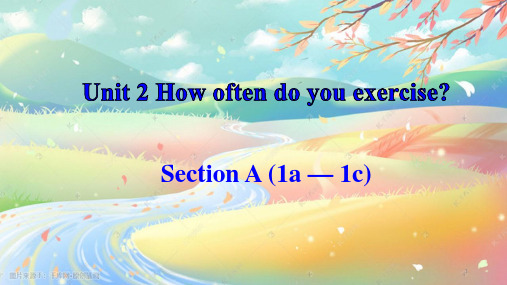
3. To learn some new words and expressions
2
What do you do on weekends? • I usually exercise. • I often do the dishes. • I hardly ever climb mountians. • I never play basketball.
1)我每天都锻炼。I exercise every day.
2)我爸爸总是做运动。My father always does exercise.
3)我们每天都做早操。We do morning exercises every day.
exercise 可以做动词,意为“锻炼”;也可以做名词,意为“运动、锻炼”时为
D. doesn't do
( B )3. I'm very tired. I can _____ run.
A. always B. hardly C. usually
D. sometimes
( D )4. My grandfather _____ every day. He looks very healthy.
Section A (1a — 1c)
1
objectives
1. To learn to talk about how often you do things with some adverbs of frequency: always/ usually/ often/ sometimes/ hardly ever /never
Unit2SectionA(2d-3c)课件-河南省淮阳中学人教版八年级英语上册(共19张PPT)
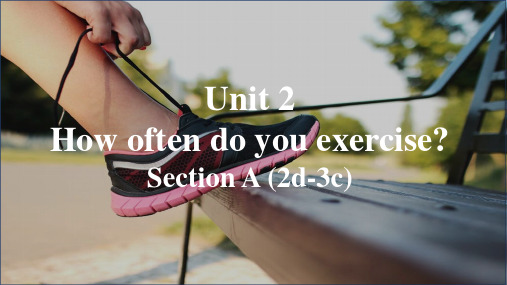
( 你多久看一次电影?)
( 我大概一个月看一次电影。)
__H_o_w__o_f_te_n__d_o_e_s_h_e_w__a_tc_h__T_V_?____ ( 他多久看一次电视?)
_H_e__h_a_rd_l_y_e_v_e_r_w__a_tc_h_e_s_T_V__. ______ ( 他几乎不看电视。)
I play football
five__ti_m__e_s_a__w_.eek
I _u_su__a_ll_y_ play football.
Mon Tue Wed Thu Fri Sat Sun
123456 7 8 9 10 11 12 13 14 15 16 17 18 19 20 21 22 23 24 25 26 27 28 29 30 31
He rides my bike
tw_i_c_e_a__w__e_e_k.
He __o_f_te_n__ rides my bike.
Mon Tue Wed Thu Fri Sat Sun
123456 7 8 9 10 11 12 13 14 15 16 17 18 19 20 21 22 23 24 25 26 27 28 29 30 31
I play football
on_c_e__a__m_o__n_t.h
We __h_a_r_d_l_y_e_v_e_r_ go to the cinema.
Mon Tue Wed Thu Fri Sat Sun
123456 7 8 9 10 11 12 13 14 15 16 17 18 19 20 21 22 23 24 25 26 27 28 29 30__d_o_es__ she do on weekends?
Unit2SectionAGrammarFocus课件人教新目标八年级英语上册
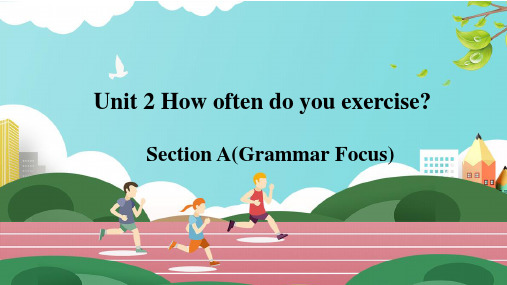
Section A(Grammar Focus)
Learning objects
1. Grasp the usage of the adverbs of frequency. 2. Talk about the daily activities freely. 3. Learn the ways of improving English and know
Match the questions and answers.
1. How often does he play soccer? a. Yes. She usually does.
2. Do you drink milk? 3. How often do they stay up
late? 4. Does Sue eat a healthy
always
usually
often
sometimes
never
2. 频度副词在句中的位置: (1)一般位于be动词、助动词或情态动词之后, 实义动词之前。 (2)有时为了强调,频度副词也可位于句首。
例:我有时起得早。
Sometimes I get up early.
3. 对频度副词的提问: 常用How often, 表示“多久一次”。 例:你多久购物一次? How often do you go shopping?
What do they usually do on weekends? They often _w_a_t_c_h__T_V_.
What does she usually do on weekends? She usually _g_o_e_s_s_h_o_p_p_i_n_g_.
新人教版八年级英语上册 Unit2 Section A 1a-1c 优质课件

What ddooesysohue usually do on weekends?
SheI usually …eexxeerrccisisees on weekends.
exercise: v. 做运动
1a. Look at the picture. Make a list of the weekend activities.
Yes, …
What do they do on weekends?
They often…
never
hardly ever sometimes
often usually always
0% 从不, 从未
很少, 几乎不 有时
经常, 常常 通常, 一般 100% 总是
1. hardly 只用作副词,其意思是“几乎 不”,表示否定概念。
e.g. He can hardly speak English. 他不太会说英语。
What ddooesysohue usually do on weekends?
SheI usually d…doeos mhery homework on weekends.
What ddooesyoheu usually do on weekends?
HeI usually w…watachtecsh TV on weekends.
Walking is a good exercise. 散步是很好的运动。
频率副词
•always意为 “总是”, 表示动作的重复或状态的 延续。 •usually意为 “通常”, 表示很少有例外。 •often意为 “经常”, 表示动作的重复, 但不如 usually那么频繁, 中间有间断。 •sometimes意为 “有时”, 表示动作偶尔发生。 • hardly意为 “几乎不”, 常和ever连用表示强调。 •never意为 “从未”。
仁爱版八年级上册Unit2 Topic 1(Section A)课件

have the flu
A: What’s wrong with …?/What’s the matter with …? B: He/She has…
பைடு நூலகம்流 感
have a cold
have a fever have a cough have the flu
have a headache
have a
1. Write down the words about the illnesses. 感冒__c_o_l_d___ 发烧__fe_v_e_r__ 咳嗽__c_o_u_g_h头痛_h_e_a_d_a_che
牙痛_t_o_o_th__a_c_h_e 背痛_b_a_c_k__a_ch_e 胃痛__s_to_m__a_c_h_a_c_he
What’s_w__r_o__n_g_with you ?
What’s__t_h_e___ _m__a_t_t_e_r_ with you ?
words
headache toothache backache dentist
phrase s
sentence s
have a cough have the flu get well
have a toothache have a backache stomachache
A: What’s wrong with …?/What’s the matter with …? B: He/She has…
have a cold
A: What’s wrong with …?/What’s the matter with …? B: He/She has…
Skill aims:
3.The students will be able to learn how to give advice with “should/ shouldn’t”.
人教版八年级英语上册第二单元Section-A省公开课获奖课件说课比赛一等奖课件

Walking is a good exercise. 散步是一项很好旳运动。
go to the movies read
watch TV
sleep go shopping
exercise
help with housework
play computer games
What do you usually do on weekends? I usually / often …
Linda is always on time. 4、You parents go out for a walk.(often)
You parents often go out for a walk. 5、Mike usually exercises (exercise) on
weekends. 6、She sometimes goes (go)shopping after
一般目前时态中,频度副词不
影响动词旳三单变化。
2. hardly 只用作副词,其意思是“几乎 不”,表达否定概念。
e.g. He can hardly speak English. 他不太会说英语。
hardly ever 几乎从不 e.g. Peter is hardly ever late.
彼得几乎从不迟到。
8. 一周两次 _t_w_i_ce__a__w__e_e_k__ 9. 一年七次 s_e_v_en___ti_m_e_s__a__year 10.一种月一次 _o_n_c_e_a__m__o_n_t_h__ 11. 一天三次 _th_r_e_e_t_i_m_e_s__a_d_a_y 12.摇晃舞 s_w__in_g__d_a_n_c_e____ 13.上钢琴课 _h_a_v_e__p_ia_n_o__le_s_s_ons 14.…怎么样? _H__o_w__a_b_o_u_t____ 15.不得不做某事 _h_a_v_e__to__d_o_s_t_h_._ 16.打网球 _p__la_y__te_n_n_i_s____
2023年人教英语八年级上册Unit 2 Section A (1a-1c)课件优选课件

Reporter: How about you? Girl 3: I _h_a_r_d_l_y__ev_e_r_ watch TV. I _a_lw__a_y_s read. Reporter: Oh, _w_h_y__i_s _th__a_t ? Girl 3: Oh, I don’t know. I guess I just like books.
►为你理想的人,否则,爱的只是你在他身上找到的你的影子。 ►冲冠一怒为红颜,英雄难过美人关。只愿博得美人笑,烽火戏侯弃江山。 宁负天下不负你,尽管世人唾千年。容颜迟暮仍为伴,倾尽温柔共缠绵。 ►蜜蜂深深地迷恋着花儿,临走时留下定情之吻,啄木鸟暗恋起参天大树, 转来转去想到主意,便经常给大树清理肌肤。你还在等待什么呢?真爱是 靠追的,不是等来的!
补全单词
Exercises
1. — What do you usually do on w_e_e_k_e_n_d_s___? — I often watch TV.
2. The weather here is so cold, I can h_a_rd__ly__ stand it.
3. Grandpa is pretty healthy because he ex_e_r_c_i_se_s___ every day.
movies, go shopping, on weekends. ➢ Key sentences:
1. How often do you exercise? 2. What do you usually do on weekends? 3. I usually watch TV. ➢To learn the adverbs of frequency.
►为你理想的人,否则,爱的只是你在他身上找到的你的影子。 ►冲冠一怒为红颜,英雄难过美人关。只愿博得美人笑,烽火戏侯弃江山。 宁负天下不负你,尽管世人唾千年。容颜迟暮仍为伴,倾尽温柔共缠绵。 ►蜜蜂深深地迷恋着花儿,临走时留下定情之吻,啄木鸟暗恋起参天大树, 转来转去想到主意,便经常给大树清理肌肤。你还在等待什么呢?真爱是 靠追的,不是等来的!
人教版英语八年级上册Unit2 Section A 1a-2c 课件
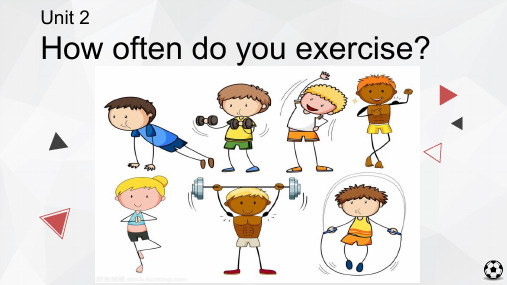
Class Schedule
Monday Tuesday Wednesday Thursday Friday
1
2
3
4
5
6
7
History
History
8
They have history class twice a week. They sometimes have history class.
Class Schedule
Monday Tuesday Wednesday Thursday
Friday
1
2
3
4
5
6
7
8
PE
They have PE class once a week. They hardly ever have PE class.
Class Schedule
Monday Tuesday Wednesday Thursday Friday
Monday Tuesday Wednesday Thursday Friday
1
English
2
English
3
English
English English Geography
4
5
Geography
6
English
7
History
History
8
PE
Geography
Class Schedule
How often do you…? How often does he/she…?
Student A: How often do you…? Student B: I…. Student C: How often does he/she …? Student D: He/She …
初中英语 人教八年级上册 Unit2 SectionA 1a-2d 课件(共18张PPT)

100%
8
80%
always
usually
60%
40%
often
sometimes
I’m 0
10%
Hardly ever
0% never
Adverbs of9 frequency
100% 80% 60% 40% 10% 0%
never hardly ever sometimes often usually always
1b
11
Listen and write the letters from the picture above on the
lines below.
Always 100% Usually 80% often 60% sometimes 40% Hardly ever 10%
never 0%
1c
12
14
2b Listen again. Match the activities in 2a with how often Cheng Tao does them.
Activities a. ___ go to the movies b. ___ watch TV c. ___ shop d. ___ exercise week e. ___ read
从不 几乎不
有时
常常 通常 总是
1 a Look at the picture.
10
Make a list of the weekend
activities.
1. _h_e_l_p__w__it_h__h_o_u_s_e__ 2. _g_o__s_h_o_p__p_i_n_g_____ 3. _w__a_t_c_h__T_V________ 4. _r_e_a_d__b__o_o_k_s______ 5. __e_x_e_r_c_is_e_________
- 1、下载文档前请自行甄别文档内容的完整性,平台不提供额外的编辑、内容补充、找答案等附加服务。
- 2、"仅部分预览"的文档,不可在线预览部分如存在完整性等问题,可反馈申请退款(可完整预览的文档不适用该条件!)。
- 3、如文档侵犯您的权益,请联系客服反馈,我们会尽快为您处理(人工客服工作时间:9:00-18:30)。
Section A
body
Name each part of the body
arm
earLeabharlann foot eyefeet
hand
leg
mouth nose
tooth teeth neck
Where is his neck?
head eye
ear face arm hand back leg
You should drink some hot tea with honey You should see a dentist.
You should lie down and rest.
You should drink lots of water.
What’s the matter with him?
have a cold backache stomachache
headache
sore throat
toothache
Discussion
Do you have any matter? What should we do to keep healthy?
How can we stay healthy?
have a headache
have a sore back
have a sore throat
have a stomachache
A: What’s the matter with him?
B: He has a….
What should they do?
What’s the matter with her? She has a cold. What should she do? She should drink lots of water.
What’s the matter with him? He has a stomachache. What should he do? He should lie down and have a rest.
Pairwork
Make conversations with your partner with the following pictures: A: What’s the matter? B: I’m not feeling well. I have a fever. A: When did it start? B: About two days ago. A: Oh, that’s too bad. You should have a rest. B: Thank you .That’s a good idea. A: I hope you feel better soon.
She has a sore throat.
What’s the matter with him?
He has a headache.
What’s the matter with him?
He has a toothache.
What’s the matter with him?
He has a stomachache.
have a cold
have a fever have a toothache
---- What’s the matter with you? What’s the matter with you? ---- I have a ….. I have a cold.
have a sore neck
What’s the matter with you?
I have a toothache. You should see a dentist. That’s a good idea.
What’s the matter with her? She has a sore throat. What should she do? She should drink some hot tea with honey.
Eat right! sleep right!
exercise to keep right!
nose mouth
tooth(teeth)
stomach
foot(feet)
Follow me:
• • • • • • •
Everybody moves your body Nod your head and touch your face Touch your nose and close your eyes Touch your ears and clap your hands Raise your arms and look at your back Touch your stomach and tap your foot Sit down and move your legs
He has a cold.
What’s the matter with him?
He has a fever.
What’s the matter?
He has a sore back
What’s the matter?
He has a sore neck.
What’s the matter?
Listen and look at the picture. Then number the names 1-5.
• • • • •
4 Nancy _____ 1 Sarah _____ 2 David _____ Ben _____ 5 Judy _____ 3
Listen again. Fill in the blanks.
